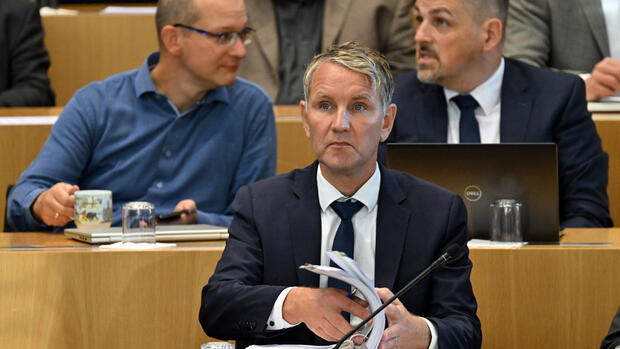Erfurt The opposition has pushed through a tax cut in Thuringia for the first time against the will of the red-red-green government. A CDU bill for a lower real estate transfer tax received a majority in the Erfurt state parliament on Thursday because, alongside the FDP, the AfD contributed the decisive votes.
The CDU initiative caused a stir and raised questions among the political competition, as is the view of the largest opposition faction in the Thuringian state parliament with the firewall against the AfD, which is classified as proven right-wing extremist by the Office for the Protection of the Constitution in Thuringia.
It was decided by 46 votes to 42 to reduce the real estate transfer tax. Home builders and property buyers only have to pay 5.0 instead of 6.5 percent tax. According to forecasts, the loss of income is 48 million euros annually.
Representatives of the government coalition of the Left, SPD and Greens criticized the tax cut as a “unique process” and a “pact with the devil”. The CDU gives the AfD leeway and influence on the state budget, said Left parliamentary group leader Steffen Dittes. The CDU is beginning to “actually set in motion a small government coalition in the opposition, including the AfD”.
Thuringia’s AfD parliamentary group leader Björn Höcke was satisfied: “This is simply a good day for Thuringia, this is pragmatic politics.” Höcke said it was an “old AfD project” and his parliamentary group had already submitted a similar proposal in 2018 submitted to Parliament. At that time it was rejected.
“There has been a majority in this state parliament since October 2019 – and this majority theoretically consists of the bourgeois parliamentary groups,” said Höcke. He was happy that the “CDU had the courage today” to “persist” with the draft law.
Merz defends the actions of the CDU parliamentary group
Shortly before the vote, Prime Minister Bodo Ramelow (Left) invited CDU parliamentary group leader Mario Voigt to talk about alternatives to family support. The state parliament session was temporarily interrupted due to constitutional concerns regarding passages of the CDU law.
The government has had time to make proposals since March, replied Voigt. The opposition voted against referring the law back to the budget committee. Finance Minister Heike Taubert (SPD) said the government reserved the right to take the matter to the Constitutional Court.
The CDU federal chairman Friedrich Merz defended the actions of the Thuringian CDU parliamentary group before the vote. “We do not make what we discuss in the state parliaments and in the German Bundestag dependent on other factions,” said Merz on Thursday in RTL/ntv’s “Early Start”. There will be no cooperation with the AfD at the federal or state level. “It stays that way.”
>> Read here: Can the AfD do business? How economists evaluate the party’s proposals
Voigt argued similarly, justifying the tax cut with family support for their own homes and impulses for the ailing construction industry and the skilled trades. “We cannot make the solution to problems dependent on the wrong side threatening to agree,” he said again and again. Federal Vice President Karin Prien, who is more associated with the liberal CDU wing, also made similar statements in the “Bild” newspaper.
Söder: “Relieving the burden on citizens is nothing extreme”
CSU boss Markus Söder, in turn, defended CDU chairman Merz’s statement on Thursday evening that he would not become dependent on other factions. “I think he’s right,” said the Bavarian Prime Minister in the RTL “Nachtjournal Spezial”. “Incidentally, it would be up to the other democratic parties to support this good idea of a tax cut, because relief for citizens is not something extreme, but makes sense.”
Söder said the federal government was only burdening citizens. “In this respect, the traffic light parties in Thuringia could send a good signal for political decency and relief for citizens.”
The FDP chairman Christian Lindner has rejected his party’s shared responsibility in Thuringia for the AfD-supported tax cut there. “Now we don’t want to confuse cause and effect,” said the Federal Finance Minister at a live interview event with the “Augsburger Allgemeine” (Friday) on Thursday evening at the newspaper’s place of publication.
It was a request from the CDU parliamentary group. “That’s why it’s now the responsibility of the CDU.”
“The good cause of reducing the real estate transfer tax so that people can more easily acquire property has not been done any favors,” said Lindner. And with regard to the approval of the AfD, which the country’s Office for the Protection of the Constitution has classified as right-wing extremist: “I don’t think that’s a good signal.”
The majority situation in the Thuringian state parliament is difficult: Ramelow’s red-red-green coalition has not had its own majority since taking office in 2020 – it is four votes short in parliament. She is always dependent on compromises when making decisions – so far especially with the CDU. A new state parliament will be elected in Thuringia in 2024.
More: The AfD boom – These graphics explain the background
